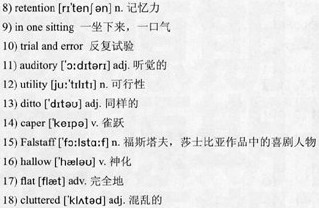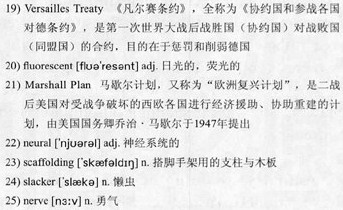文字难度:★★★
Every September, millions of parents try a kind of psychological 1)witchcraft in an attempt to transform their summer-2)glazed campers into fall students; their video-3)bugs into 4)bookworms. Advice is cheap and all too familiar: Clear a quiet work space. Stick to a homework schedule. Set goals. Set boundaries.
每到九月份开学时,无数的家长就开始施展心理暗示法,试图使那些暑假外出玩疯了的孩子为秋季开学做好准备,使那些电视迷变身啃书虫。耳熟能详的免费建议是:清理出一个安静的学习空间,严格遵守家庭学习时间表,树立目标,定下规矩。
 Such theories have developed in part because of 5)sketchy education research that doesn’t offer clear guidance. Student traits and teaching styles surely interact; so do personalities and at-home rules. The trouble is that no one can predict how.
Such theories have developed in part because of 5)sketchy education research that doesn’t offer clear guidance. Student traits and teaching styles surely interact; so do personalities and at-home rules. The trouble is that no one can predict how.
这些理论之所以形成并沿用至今,部分原因是概略的教育研究无法给出清晰的指引。学生的特质和教学方式固然互相影响;孩子个性和父母的管教亦如是。问题是,无人能预知两者如何相互作用。
Yet there are effective approaches to learning, at least for those who are motivated. In recent years,6)cognitive scientists have shown that a few simple techniques can reliably improve what matters most: how much a student learns from studying.
然而有效的学习方法还是有的,至少对那些积极主动的孩子来说会比较有效。近年来,研究认知学的科学家已经证明,一些小技巧能有效帮助我们在学习中掌握更多的知识,这是学习过程中最重要的一方面。
The findings can help anyone, from a fourth grader doing 7)long division to a retiree taking on a new language. But they directly contradict much of the common wisdom about good study habits, and they have not caught on.
研究发现的结果能帮助任何学习者,从做着长除法计算的四年级学生到学习一门新语言的退休老人。然而这些方法与人们对良好学习习惯的一般认识大相径庭,而且还未广为流传。
For instance, instead of sticking to one study location, simply alternating the room where a person studies improves 8)retention. So does studying distinct but related skills or concepts 9)in one sitting, rather than focusing intensely on a single thing.
例如,人们通常认为应该固定在一个地方学习,但是研究发现,只要换一下学习空间就能帮助增强学习者的记忆力。同样,一坐下来学习,就要变换着使用不同但相关的技巧和概念,而不是把精神完全集中在某一方面上。
“We have known these principles for some time, and it’s intriguing that schools don’t pick them up, or that people don’t learn them by 10)trial and error,” said Robert A. Bjork, a psychologist at the University of California, Los Angeles. “Instead, we walk around with all sorts of unexamined beliefs about what works that are mistaken.”
“我们得出这些理论已经有一段时间了,可是有趣的是,学校都不采纳这些理论,或者说人们不懂得从反复实验和失败中得出这些理论,”加州大学洛杉矶分校的心理学家罗伯特·A·比约克说,“相反地,我们一直信奉各种未经实验证明的理论,但实际上这些理论都是错误的。”
Take the notion that children have specific learning styles, that some are visual learners and others are11)auditory; some are left-brain students, others right-brain. In a recent review of the relevant research, published in the journal Psychological Science in the Public Interest, a team of psychologists found almost zero support for such ideas. “The contrast between the enormous popularity of the learning-styles approach within education and the lack of credible evidence for its 12)utility is, in our opinion, striking and disturbing,” the researchers concluded.
比如说,人们通常认为孩子们都有其独特的学习习惯,有些是“视觉型”学习者,其他是“听觉型”学习者;有些学生习惯用“左脑”,其他的则用“右脑”。最近有一群心理学家对这方面的相关研究进行了重新验证,并且将结果发表在《大众心理学期刊》上,他们发现上述理论几乎找不到任何证据支撑。“这种学习类型教育法广为大家接受,但是其应用的可行性却是如此缺乏可靠根据,这种矛盾让我们很是吃惊和困扰,”研究人员总结道。
13)Ditto for teaching styles, researchers say. Some excellent instructors 14)caper in front of the blackboard like summer-theater 15)Falstaffs; others are reserved to the point of shyness. “We have yet to identify the common threads between teachers who create a constructive learning atmosphere,” said Daniel T. Willingham, a psychologist at the University of Virginia and author of the book Why Don’t Students Like School?
教学风格也是如此,研究人员说。有些优秀的老师在黑板前非常活跃,就像夏日剧场上演的莎翁名剧里的喜剧人物“福斯塔夫”;有些则内敛到害羞的程度。“能营造出积极氛围引导学生学习的教师其共通点是什么,这个我们至今还没得出什么结论”丹尼尔·T·威林厄姆说,他是弗吉尼亚大学的心理学家,著有《为什么学生不喜欢上学》一书。
But individual learning is another matter, and psychologists have discovered that some of the most16)hallowed advice on study habits is 17)flat wrong. For instance, many study skills courses insist that students find a specific place, a study room or a quiet corner of the library, to take their work. The research finds just the opposite. In one classic 1978 experiment, psychologists found that college students who studied a list of 40 vocabulary words in two different rooms—one windowless and 18)cluttered, the other modern, with a view on a courtyard—did far better on a test than students who studied the words twice in the same room. Later studies have confirmed the finding for a variety of topics.
但是个人学习则是另一码事,心理学家发现,说到学习习惯,很多备受推崇的建议其实完全是错误的。例如,很多教授学习方法的课程坚持认为,学生应该找一个特定的地方,自习室或者图书馆里的安静角落来做功课。研究结果发现却恰恰相反。在1978年的一个经典实验中,数名大学生在两个不同的房间里学习两遍清单上列出的40个生词—— 一遍在一个没有窗户兼满布杂物的房间里学习,另一遍则在可以看到庭院景观的现代化房间里学习——结果,心理学家发现,在单词测验中这些学生考得比那些在同一个房间里学习两遍的学生要好得多。此后就不同课题而做的研究都证实得出同样的结论。
The brain makes subtle associations between what it is studying and the background sensations it has at the time, the authors say, regardless of whether those perceptions are conscious. It colors the terms of the 19)Versailles Treaty with the wasted 20)fluorescent glow of the dorm study room, say; or the elements of the 21)Marshall Plan with the jade-curtain shade of the willow tree in the backyard. Forcing the brain to make multiple associations with the same material may, in effect, give that information more 22)neural 23)scaffolding.
研究人员说,大脑会在学习的内容与对学习环境的感知之间建立起微妙的关联,不管学习者本人对此是否察觉。比如说,宿舍自习室的废旧日光灯会强调突出《凡尔赛条约》的条款;或者,后园柳树投下的玉帘绿影会突出马歇尔计划的内容。强迫大脑就同一事物建立多种联系,结果会为大脑掌握信息提供更充分的神经连接支架。
“What we think is happening here is that, when the outside context is varied, the information is enriched, and this slows down forgetting,” said Dr. Bjork, the senior author of the two-room experiment.
“我们认为,这意味着当外界环境发生变化时,信息会得到补充,这会延缓遗忘,”上述“两房实验”的高级研究员比约克博士说。
But the thing is, none of this suggests that the techniques—alternating study environments or mixing content, spacing study sessions—will turn a grade-C 24)slacker into a grade-A student. Motivation matters. So do impressing friends, making the hockey team and finding the 25)nerve to text the cute student in social studies.
然而重要的是,这一切发现并不是说那些技巧——在不同的环境空间中学习,交叉混合学习内容,分隔学习时间段——可以把一个成绩不佳的懒鬼变成一个成绩优异的学生。动机才是关键。在博取朋友青睐方面也是同样道理,加入曲棍球队,还有鼓起勇气给修社会学的那位万人迷同学发短信吧。
“In lab experiments, you’re able to control for all factors except the one you’re studying,” said Dr. Willingham. “Not true in the classroom, in real life. All of these things are interacting at the same time.”
“在实验室做实验,除了研究对象之外,其他的所有因素都在你掌控之内,” 威林厄姆博士说,“但是在教室里,在现实生活中却并非如此。所有的因素都同时互相作用。”
But at the very least, the cognitive techniques give parents and students, young and old, something many did not have before: a study plan based on evidence, not schoolyard folk wisdom, or empty theorizing.
但至少,认知技巧带给了家长和学生、年轻人和老人以及许多人都未尝试过的东西:一个基于实证的学习计划,而非校园坊间的智慧或空洞理论。




